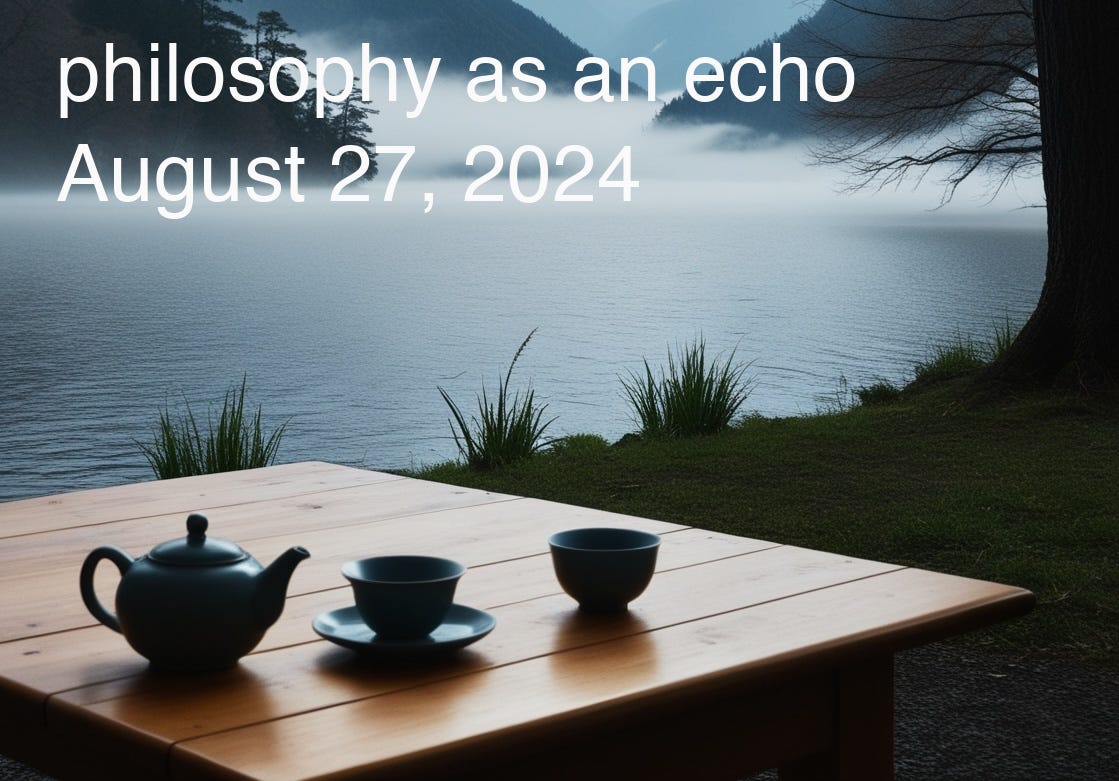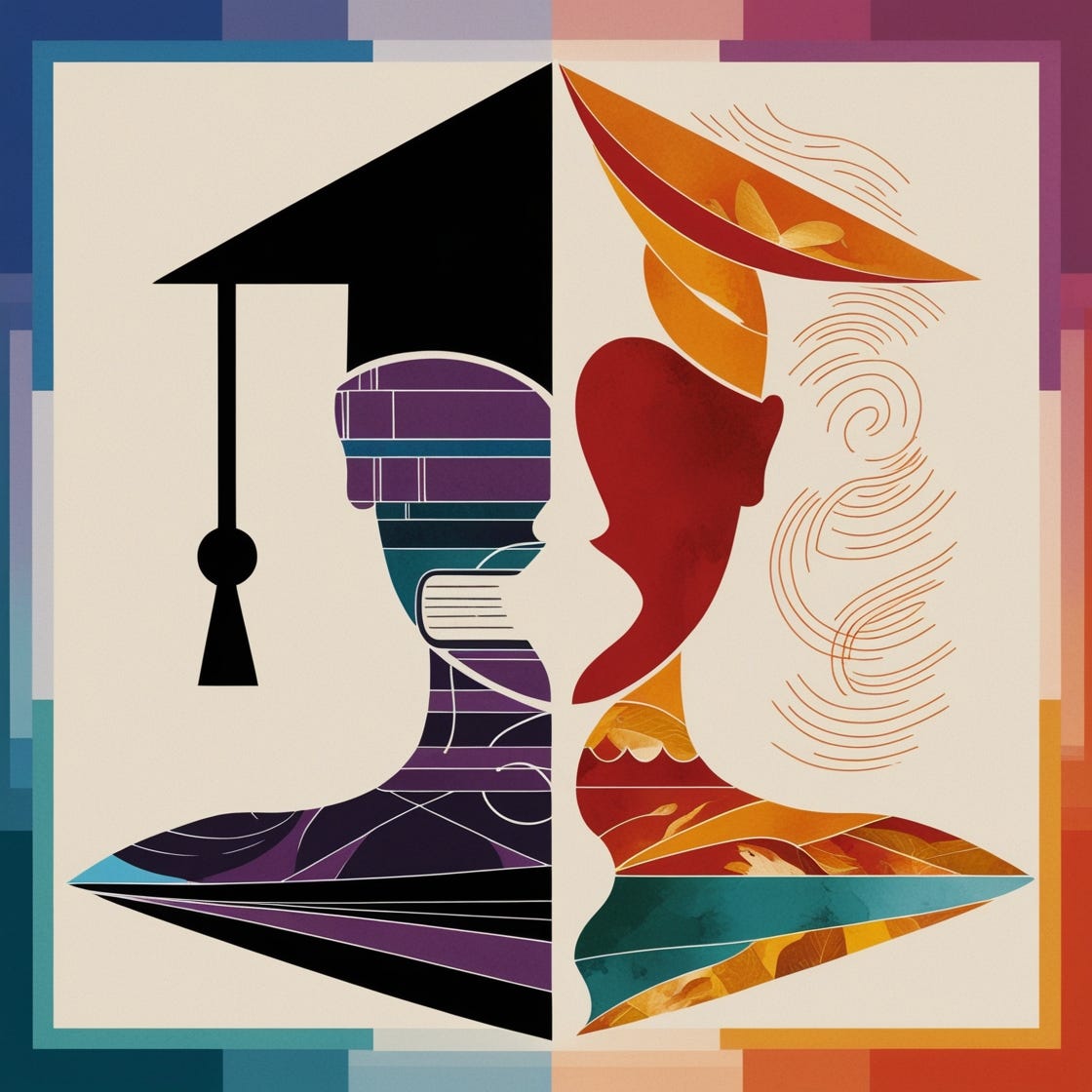philosophy as an echo
trying to figure out how to fit a study of philosophy into my life
One of the guiding ideas behind this blog is as follows:
Philosophy is done about things. The goal of this blog is to take, as an object of philosophical investigation, not a logical puzzle or abstract question, but normal, every day life.
I want to spend some time reflecting on exactly this, and expressing some of my concerns about taking my study of philosophy further.
I am at the point in my philosophical career where I must decide whether to apply for graduate school in philosophy or not. I am leaning towards not. There are a number of personal reasons for this, but also, ironically, some philosophical ones.
As I’ve majored in philosophy, I’ve changed my mind about my area of focus a few times. I started pretty utilitarian, but, as time went on, became more and more interested in all encompassing but harder to grasp ideas. I’ve become less interested in classic ethical questions (‘is killing different from letting die?’) and run-of-the-mill deep philosophical questions (questions like: ‘does free will exist’) and have turned to questions that are themselves harder to ask, but, I think, get closer to the heart of what we are. Questions about the nature of our minds and identities.
But put the content of all that aside. I don’t want to say that one set of questions is better or more important than another; I just happen to find a one set more interesting.
That is not my subject for today.
What I want to note is that this transition for me — between questions — has not been a philosophical one. More often than not, I am simply living my life and…boom. A new question is interesting to me, and, suddenly, a question that I spent a summer pondering begins to look but a waste of time. It is a change I have been mostly passive to.
I use the term ‘passive’ to contrast this change with a more active sense in which a person might have a change of focus. One might be convinced by an argument, or have an epiphany of sorts that these are the questions she wants to ask. Perhaps she decides that the previous set of questions is not worthwhile, and to focus on this new one. In these cases, our imagined person plays an active role in changing her focus. It is her very decision that fixes the question she finds interesting. Or something like that.1
Of course, just because a change in interests is one that occurs in me passively does not mean that it is mysterious or ‘uncaused’. And this is what I’m interested in drawing out today, by the way. What causes my change in perspective—my suddenly ceasing to be interested in a new type of question—is more often than not an experience or problem I am faced with in some other part of my life.
To give just one example of this, I get closer and closer to needing to make a decision about what to do with my life. I graduate soon, after all. Whether to pursue graduate school or, perhaps, to go down a career path with a higher earning potential or whatever — I’ve found myself (I know, I was supposed to stop doing that) torn. Simultaneously, I’ve begun to raise philosophical questions about the meaning of life. What is a life lived well—an intellectual one, spent pondering and asking questions? What does it mean to waste a life, an opportunity?
So, the practical dilemma I am faced with — what to do after I graduate college — has influenced the philosophical question I find most pressing. Before I know it, as I wonder about how to live my own life, I begin to ask a more classical philosophical question: what it is to live a life well in general.
This question has arisen quite sneakily. It is not as if I have reasoned my way into it thinking to myself,
“Ah, answering this philosophical question will be quite useful to my practical dilemma.”
Rather, as I ask the practical question, the philosophical simply becomes more salient. And, once that is so, after all, now that I am asking its more practical sibling, I can’t just ignore it, can I?
This pattern itself, however, has made me slightly concerned about the plausibility of a career in philosophy for me. I have so far said that my interest in a philosophical question is often caused by a parallel practical problem. Yet, if this is right, if that is how I come to ask philosophical questions, then philosophy can itself never be the center of my life.
It cannot be a thing I devote my life to if my interest in it is only a side-effect of being faced with other problems. There will be no space left, after all, for the other problems.
To put it differently, I have begun to worry that my interest into philosophical questions is but an echo. Yet, if I devote my life to listening to that echo, to decoding it, to chasing after it, then I will fail to nurture the voice producing the echo. There will soon be no echo left to study.
It is truly an unwelcome paradox. The philosophical questions I ask are but an expression of whatever practical problem I happen to be faced with. To be able to continue asking new and diverse questions, I must continue to be faced with new and diverse practical issues. This implies, and here is the paradox, an answer to at least one of my practical questions. Shall I go to graduate school, shall I make a life out of philosophy? Well, if I wish to continue having any questions worth asking, it will simply be impossible. If I pursue philosophy, if I make it my life, then I risk lacking space for the practical problems that that breathe life into the study of philosophy.
Philosophical questions live off the echoes of practical life; to dedicate one’s life, then, to the study of philosophy is to snuff out the very stuff that gives one any philosophical direction in the first place.2
As a note, there is a question of whether this is possible. Whether someone could consciously do this, or if by the time they do the change will have already happened in the background. To be honest, I don’t know where I fall on this.
I state this confidently, but I am really quite open to being wrong. In fact, I would very much like to be. Any input will be much appreciated.




Yes philosophy is a journey fueled by life's problems